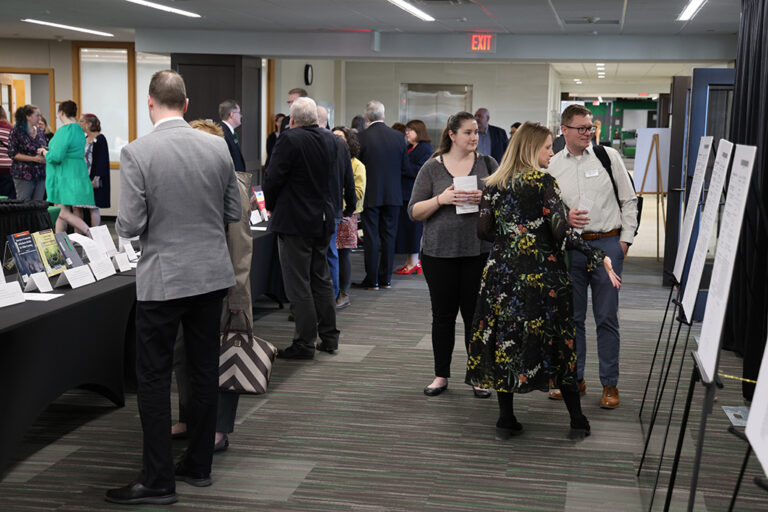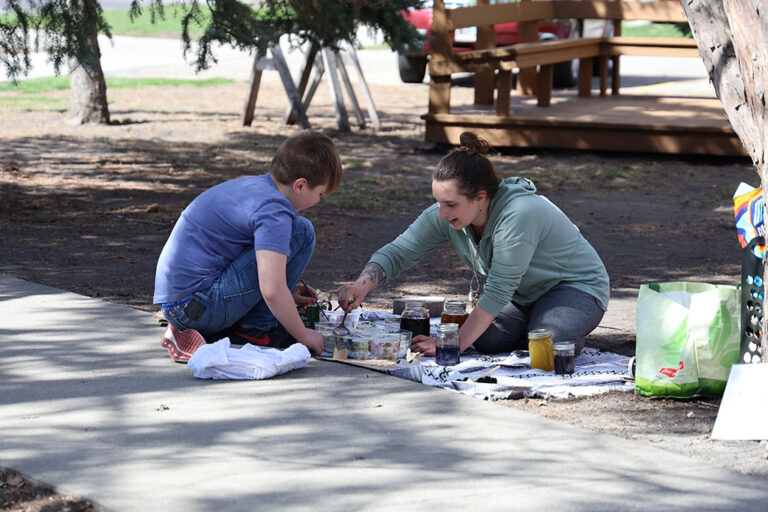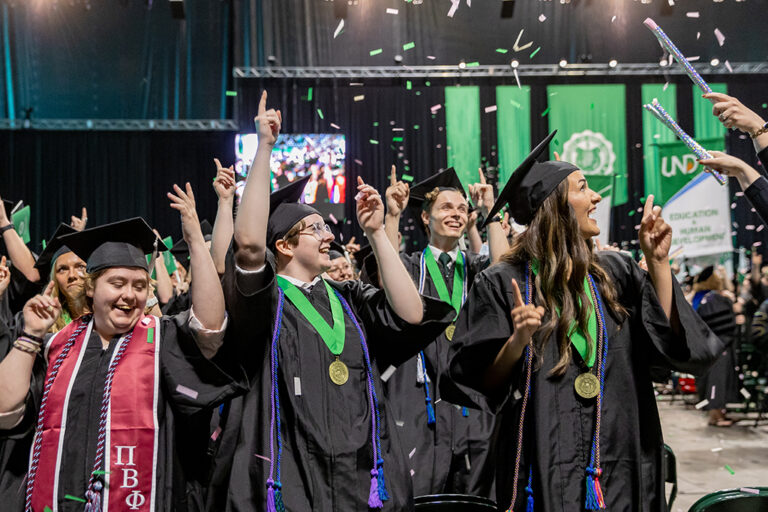Research, presented in a rush
Graduate students serve up high-speed summaries of their research during the 2024 Three Minute Thesis competition

How much plastic did you consume last week? What can deer teach us about COVID-19? Can you really trust your eyes?
Graduate students answered these questions and others at the School of Graduate Study’s Three Minute Thesis (3MT) competition on Jan. 31. The annual event, now in its eighth year, challenges students to distill months of research into a snappy, three-minute speech, using just one visual slide.
Twenty-two graduate students selected by departments across campus participated in this year’s event. Two students from each heat advanced to a final round at the end of the day, after which judges from the University and Grand Forks community picked the top three theses for scholarships of up to $750 and a chance to advance to the regional 3MT competition.
While there is a competitive element to 3MT, the overarching goal of the event is to help students communicate their research in an engaging way that anyone can understand. Or, as Chris Nelson, dean of the School of Graduate Studies, says, “We want Grandma to be able to understand what they have to say, so that her eyes aren’t glazing over at Thanksgiving dinner.”
The students prepared their brisk presentations over the last semester with the help of a team of trainers led by Communication Department Chair Soojung Kim. Students worked with their coaches for months to craft the most compelling, bite-sized research presentations possible.
“It’s about developing a lifelong skill, the ability to communicate concisely,” Nelson said. “You might need to use that skill at any time. We think having that skill will serve the students well, no matter what career paths they might take.”

Grad students rocket through research
“At the end of the week, you may have eaten plastic the size of one credit card,” said Mansurat Abdulmalik Ali, a graduate student studying environmental engineering, as she opened the final round. Her research dealt with cameras that can detect microplastics in soil and water.
This kind of sticky, attention-grabbing line is what makes three-minute theses compelling. The students present a problem, typically one with far-reaching implications, and explain how their research can contribute to solving it. It’s a simple formula, but the presentation style allows the research to stay with listeners long after the event is over.
For example, third-place winner Sarah Daman drew parallels between the spread of Chronic Wasting Disease in North Dakota’s deer population and infectious diseases such as COVID-19 in humans.
Daman, a biology student, said researchers can predict where the disease will travel by studying where deer with the disease come from and where their herds travel.
“Having this information may help us stop a pandemic by slowing the disease in its tracks long enough to find a cure,” she said.
Similarly, Kaden Bollinger, a forensic psychology student, sought to make a tangible impact with his research. He took second place for his presentation on the accuracy of eyewitness testimony.
“In the United States, 69 percent of wrongful convictions involved eyewitness misidentification,” Bollinger said. Bollinger’s slide featured photos of five innocent men who collectively spent 130 years of their lives wrongfully imprisoned.
Using a mock video of a crime, Bollinger tested the speed and accuracy with which participants could accurately identify the suspect in two different lineups. He found that some participants could not identify a suspect correctly in the second lineup, even if they had correctly identified them in the first one.
“I hope that my research and other research in this field can help to impact policy decisions to help ensure that the criminal justice system is as fair and as just as possible,” he said.
First place in the event went to energy engineering student Temitayo Ikuerowo, who researched the development of more efficient and affordable batteries for electric vehicles.
Lithium-ion batteries used in electric vehicles contain a high amount of cobalt, an expensive metal that requires significant energy, she said. Her research found that by introducing higher amounts of nickel, batteries can run more efficiently while reducing costs.
“This is exciting news for the future of EVs,” she said. “By optimizing the battery’s chemistry, we’re able to improve its performance, leading to lower costs, longer driving ranges and a cleaner environment.”

‘Practice makes perfect’
Ikuerowo relied on the old adage “practice makes perfect” to hone her presentation, she said. And taking advantage of the Graduate School’s monthly training sessions made a big difference.
“My advice to anybody who will be doing this in the future is to leverage those sessions,” she said. “Getting feedback from my peers and the trainers every month really helped me.”
Additionally, she found that developing a kind of choreography for her speech helped engage the audience. Using gestures and beats at precise moments, she drew attention to the points she wanted the audience to leave the room thinking about.
“I had to rehearse a lot,” she said. “I wanted to use a lot of body movements to make sure that people understood what I wanted them to understand. If I wanted something to stick in their heads, I’d do a movement or a pause to stress those points.”
Like previous years’ winners, Ikuerowo will present her research to the Western Association of Graduate School’s 3MT Competition in March. And, because the regional competition will be virtual, she can’t rest on her laurels for long, she said.
“I’m going to practice a lot more than I would have to understand the nitty gritty of doing things like this virtually,” she said. “They’re not in the room with you, so even if you have the same form of energy, they can just turn the volume down. You have to find other ways to get their attention.”
Ikuerowo will compete in the regional competition for a $500 cash prize and the chance to compete in the national 3MT competition.



